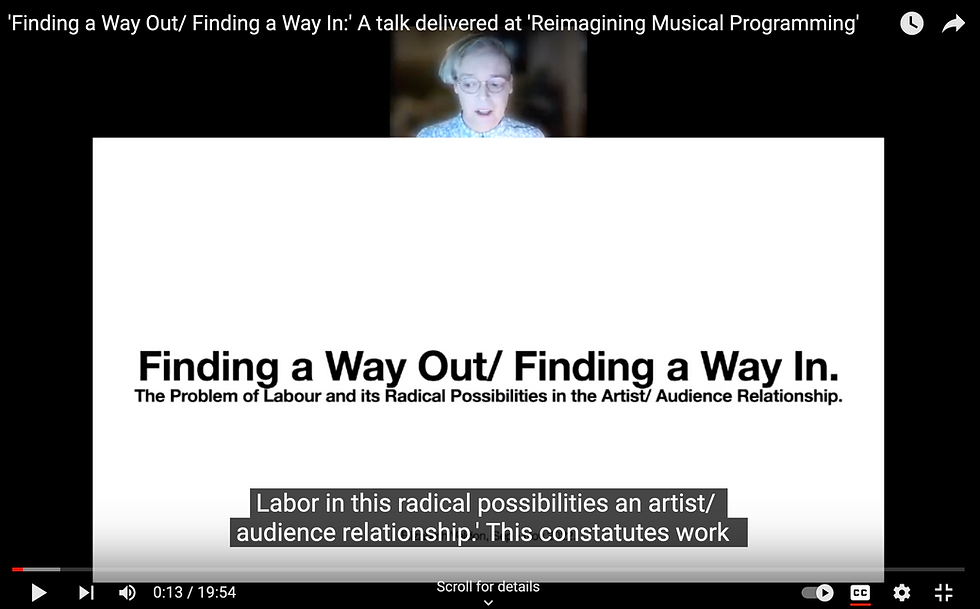- blackcirclerecords
- Feb 19, 2023
- 4 min read

Alt text: a picture of Brianna Ghey eating a chocolate bar while wearing a striped jumper. She is smiling.
This piece was read at the Aberdeen memorial for Brianna Ghey by Katherine Irvine. This version has references so that we can look back on this and prove it happened, that all of it happened. What Tiresias Said to Odysseus Over a Steaming Trench of Blood.
'A sweet smooth journey home, renowned Odysseus,
that is what you seek
but a god will make it hard for you...
Even so, you and your crew may still reach home,
suffering all the way.' (Homer, 1996: 252)
Brianna Ghey is dead.
In ‘Spectres of Marx’ Derrida says that ‘no ethics, no politics, whether revolutionary or not, seems possible and thinkable and just that does not recognise in its principle the respect for those others who are no longer or for those others who are not yet there, presently living, whether they are already dead or not yet born.’ (Derrida, 2006: 29)
Brianna Ghey is dead and there is nothing I can do, nothing we can do to bring her back.
She is a ghost already, a spectre, one who is no longer there.
Another one of our dead, another weight to carry with us.
This is not an appeal to Nihilism or a plea to pity. A girl died, a girl who liked to lip sync to pop songs, a girl who, regardless of her own pain, helped others. (Hunte, 2023)
This is not an appeal to Nihilism or a plea to pity.
‘No ethics, no politics’ can not pay service to the dead but, as Derrida reminds us, the dead, the ghosts we carry round, may not be born yet. ‘before the ghosts of those who are not yet born or who are already dead’ this is a call to remember Brianna with action, with a thirst for justice not only for her but for all the trans youth unborn, those yet to come.
Returning again to Derrida I find him arguing ‘without this non-contemporaneity with itself of the living present, without that which secretly unhinges it, without this responsibility and this respect for justice concerning those who are not there, of those who are no longer or who are not yet present and living, what sense would there be to ask the question "where?" "where tomorrow?" “whither?’ (Derrida 2006: 29-30) Without a commitment to the dead, those of our past, those of our future, our unborn, our living but not yet dead, there is no tomorrow, no ‘where now.’ In her opinion piece on Brianna’s death the barrister Robin Moira White says that ‘we know where dehumanising tactics take us, who uses them and who has used them historically…when an “other” is no longer regarded as “human,” then it is far easier to kill them’ (White, 2023) and kill them we do. We leave them breathing their last, filled with pain, far from those they love and who love them. We leave them full of fear, physical pain and alone and we tell ourselves that we are somehow protecting young people in doing so. Brianna Ghey is beyond our help now but our dead are not only the dead of our past or our freshly made corpses but those yet to be born.
Brianna Ghey’s death must come to mean something, her blood must not have soaked into the earth for nothing. We have to remind those who speak of their concerns that they left a sixteen year old girl bleeding to death in a park while national newspapers debated her right to exist, called her a danger. (Kelleher, 2023; Craggs, 2023)
We can not bring Brianna back, she has gone to her rest, gone for a long sleep where the bullies can not touch her (Ali, 2023) but our ‘yet to be born’ need us, the generation to come.
Do not let Brianna’s death be for nothing.
I write this at my kitchen table crying, the dead weighing heavy on me. To Brianna I quote Marsha P. Johnson (herself also killed, Brianna’s sibling, her guide to what comes next) ‘pay it no mind.’
References:
Ali, J. (2023) Brianna Ghey: Trans girl said she’d been excluded from school days before death. Pink News. Available at: https://www.thepinknews.com/2023/02/14/brianna-ghey-trans-teen-excluded-from-school-days-before-death/?fbclid=IwAR31K5jVzapSoDxI3b5BBnzLSBfX_G5tihgsky--JhBchD1Dx-gW2Ki1KEI (Accessed on the 14th February, 2023)
Craggs, C. (2023) Brianna Ghey had her whole life ahead of her, but even in death, she's facing transphobia. Available at: https://www.glamourmagazine.co.uk/article/brianna-ghey-charlie-craggs-opinion?fbclid=IwAR3sdZG2EgYhwi3MsAqYCRfTAKzcDvZYYHo5Yb0hEwIDUaaMI74_BA1nSps (Accessed on the 14th of February, 2023)
Derrida, J. (2006) Spectres of Marx. Translated from the French by Peggy Kamuf. New York and Abingdon; Routledge Classics.
Homer (1996) The Odyssey. Translated from the Greek by Robert Fragles. New York and London; Penguin
Hunte, B. (2023) ‘We’re Her Trans Sisters’: Friends Pay Tribute to Stabbing Victim Brianna Ghey. Vice News. Available at: https://www.vice.com/en/article/7k8gja/brianna-ghey-killing (Accessed on the 14th of February, 2023)
Kelleher, P. (2023) Brianna Ghey: The Times condemned for using teen’s deadname in ‘appalling’ coverage. Pink News. Available at: https://www.thepinknews.com/2023/02/13/brianna-ghey-trans-girl-killed-the-times/?fbclid=IwAR09UKjfXXyfiJlzTwpfy_SujosUu7wqn9Rrhi69-D7eSu7r5C7PJEt-VuI (Accessed on the 14th of February, 2023)
White, R. M. (2023) Brianna Ghey’s death was a tragedy waiting to happen. The Independent. Available at: https://www.independent.co.uk/voices/brianna-ghey-trans-girl-stabbed-death-b2281353.html (Accessed on the 14th of February, 2023) A note on Tiresias
Tiresias is the great seer of Greek mythology who was transformed into a woman by the goddess Hera and lived seven years as her priestess. Tiresias' wisdom is attributed to their transgressing of gendered and sexed roles.
The 'trench of blood' in the title refers to the eleventh book of the Odyssey where Odysseus descends into the afterlife to obtain a prophesy from Tiresias.

